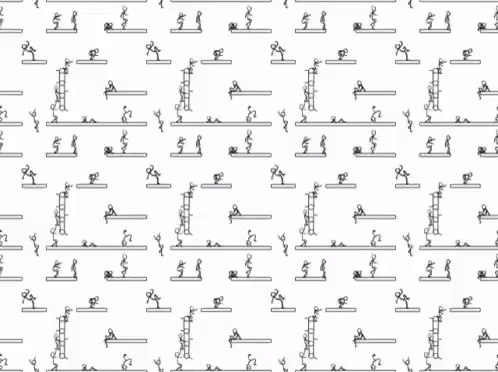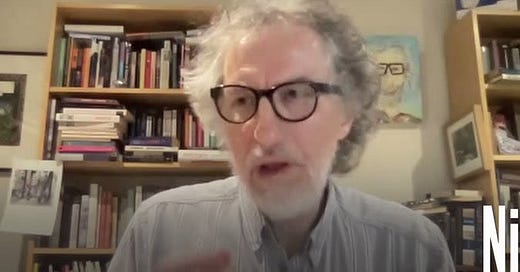Hi all,
Firstly, after back and forth mailing to the substack team, I would like to say that the platform switch has finally been achieved. So expect to receive these series via Substack now.
First up, if you follow this tweet, you’ll find me doing an interview on an American program called Infinite Loops. I’m talking about our ailing democracy and what can be done about it. Below are some links for the week.
Cheers,
Nicholas
Nicholas Gruen — Rethinking Democracy with Juries


American nationalisms and the American revolution: Brad DeLong
A fabulous and very typical essay from Brad DeLong. Typical in its trenchant centrism and its capacious knowledge. And it exemplifies the Brad DeLong essay which is not polished for publication, and sometimes in the form of notes, but which is nevertheless lucid, powerful and rather the better for the (apparent) speed with which it’s written.
Tweet thread 1
In response to this tweet:


One of my great disappointments is that mainstream economics used to embody these truths (albeit in an appropriately cut down economic version)
Or as my (economist) Dad used to say "money's very important until you have enough and then it's not".
https://clubtroppo.com.au/2013/05/20/the-politics-of-envy-or-something-more-worthy/
But that disappeared as economics' pretensions to being 'scientific' became more and more extreme. Then the simplest commonsense — that 1$ to a poor person is worth more than to a millionaire — became controversial, because unprovable.
That same fastidiousness about value judgements and thus against making interpersonal comparisons of the value of money should mean that GDP per capita doesn't tell us anything much about economic welfare. But nature abhors a vacuum and so does punditry.
And so economics — the discipline that should have been the premier social science telling us that insatiability is a lousy guide to human happiness or even economic welfare — was actively undermining our own culture which once conveyed these things loud and clear.
Now the world is run by those who have embraced insatiability and clambered their way over others to the top of the various hierarchies in our society.
Most of those who've done it — politics, in business, in academia (the churches?), are miserable. But their insatiability is all they have to show for it, and all they have left.
At least those at the top of the entrepreneurial tree — Elon and co — seem to be enjoying themselves which is a mercy.
Tweet threads 2 & 3 from Bill Stanner
From Anthropologist Bill Stanner, "Aborigines and Australian Society", 1972
You will find a very characteristic picture given in the Reverend J.G. Wood’s The Natural History of Man (1870). He was a reasonably good scholar who tried to be objective. He saw many admirable qualities in the Aborigines but was quite clear that they had no future; more, he hardly thought they deserved a future, because they had ‘performed badly half their duties as men’. They had inherited the earth, but had not subdued it and did not replenish it. In fact "they left it in exactly the condition in which they found it. occupied precisely the same relative position towards the human race as do the lion, tiger and leopard towards the lower animals and suffered in consequence the same law of extinction". The coming of the white man was not a curse: it was a benefit. It offered them a means of infinitely bettering their social condition. But they could not appreciate the means. As a natural consequence, they had to make way for those who could.
"The cause of extinction lies within the savage, and ought not to be attributed to the white man, who comes to take the place the savage has practically vacated [and nearly depopulated] by his everlasting quarrels, irregular mode of existence and carelessness of human life."
I would hardly have thought it worthwhile to set out this old point of view were I convinced that we had done with all of it for ever. But I am not convinced. Something very like parts of it lingers on, alive and powerful, but in another dress.
Bill Stanner, 1972
Human history crawls with invitations to feel vicarious guilt. Only a robust common sense saves any of us from a sense of despair about it. No doubt I too would have subscribed to the comforting theory of ‘long ago and far away’ about Aboriginal conditions but for two things. I got to know and lived with Aborigines who were the victims of things that had happened in their lifetime and mine: the injuries to their interests were visible, present and continuing. And I discovered that Aboriginal ideas, customs and values, when well arranged and transposed into words with meanings understandable to us in relation to familiar things, were enormously impressive in the human sense. You cannot be long in Aboriginal company without becoming aware of the passion and conviction with which they believe in their tradition, and of their dignity and honesty in instructing those who are interested to learn. What they have to say is educative to a degree which our schools and universities are the poorer for not trying to understand and teach. It is, in my opinion, true to a most lamentable extent that Aborigines are administered, controlled, educated and so on by people who know almost nothing about them and give a good appearance of believing that there is nothing significant to learn. Yet no one who took part in the Yirrkala land case came out of it without a heightened respect for Aboriginal life, ideology and values. What we all saw there were black men who, in the very process of failure, won white minds to a new point of view. Their only failures were against 18th century law, ‘history’ as we construct it, and some rather intractable European superstitions about land
Anthropologist Bill Stanner, "Aborigines and Australian Society", 1972
An exchange on Wengrow and Graeber
David Graeber and David Wengrow’s The Dawn of Everything, has made quite a splash and I’ve had it recommended to me by several people. Unfortunately, I regard Graeber as disreputable. I don’t trust him since I ran into this (Graeber’s reply here) and this. I enjoyed Graeber’s article on Bullshit Jobs, though I was disappointed with its lack of any attention to the obvious question which is why people trying to make money would hire workers to do things that were socially useless. I thought surely that would be remedied in a whole book dedicated to the subject, but, as I argue in this podcast interview, I was wrong. So I’ll wait for the dust to settle and pick up any contribution through the sieve of further discussion as it emerges. This exchange shows that Graeber’s collaborator has the same combative style, which strikes me as a pity.
Eristical and dialectical discourse
I was unaware of the term ‘eristical’ but being used by a favourite philosopher of mine — R. G. Collingwood — I read on and was glad I did. The title is a bit offputting but the distinction between ‘eristical’ and ‘dialectical’ is one you won’t want to do without (though you probably haven’t been doing without out it so much as knowing it by another name). Before reading this I had coined for myself the distinction between ‘dialogue as contest’ and ‘dialogue as cooperation’ — more or less the same idea but nice to have the added thought that that was what Socrates was up to.
Revolutionary idling
I’m a huge fan of Inside Story, easily the best regular and general Australian e-zine at least for my taste. They’ve been publishing from their archive this article and the one below.
How Harold Holt was lost
My friend Rory Sutherland drew this article to my attention — I wasn’t going to read it, but enjoyed doing so. And replied to his email thus:
Here’s an extract from a speech I gave at my father’s memorial. Its relevance will become clear!
Dad combined a civility which, one might speculate, he brought with him from Austria, with an Australian unpretentiousness and straightforwardness. I think when I was young I thought that the expression ‘g’day’ was particularly my father’s. He certainly took to it with great gusto.
A episode which illustrates these things and his great sense of humour occurred one day in 1967. We were being entertained for lunch by a rather straight laced American economist in the Mid-West of America. He introduced lunch in a way which he thought appropriate but which we found intensely embarrassing.
He said that although we might not have voted for Harold Holt, he wanted us to know that he was extending the hand of American friendship and condolence to us in our national grief. My father showed the depth of his assimilation into Australian culture by defusing the situation. "Yes Ken. It is sad. But that’s the good thing about living in Australia. Its a small country. And when something like that happens, we all just move up one!"











